Commentary: PNP chiefs' scorecard on 'drug war'; Bato's term top in number killed
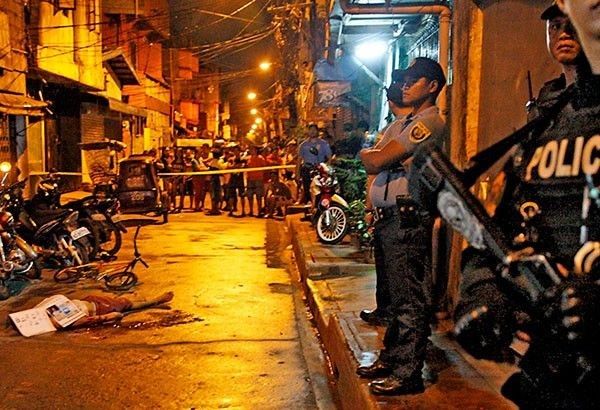
MANILA, Philippines — On January 31, 2021, Sen. Ronald “Bato” dela Rosa told the press that he was optimistic he will soon have a new US visa.
A year earlier, he told the media that his US visa had been canceled. Neither he nor the US Embassy in Manila said why and when it happened. The senator surmised that his role in President Rodrigo Duterte’s drug war may have been the reason behind it.
In pique, or so he made it appear, President Duterte abrogated the Visiting Forces Agreement with the US — a decision that has not really taken effect since he eventually backtracked and suspended the termination of the VFA.
Dela Rosa was Duterte’s chief of the Philippine National Police when drug-related killings reached unprecedented scale. That Duterte has almost thrown away a key security agreement in defense of his former PNP chief, speaks not only of the closeness of Dela Rosa and Duterte but of how invested this presidency is in the PNP chief in waging war on drugs.
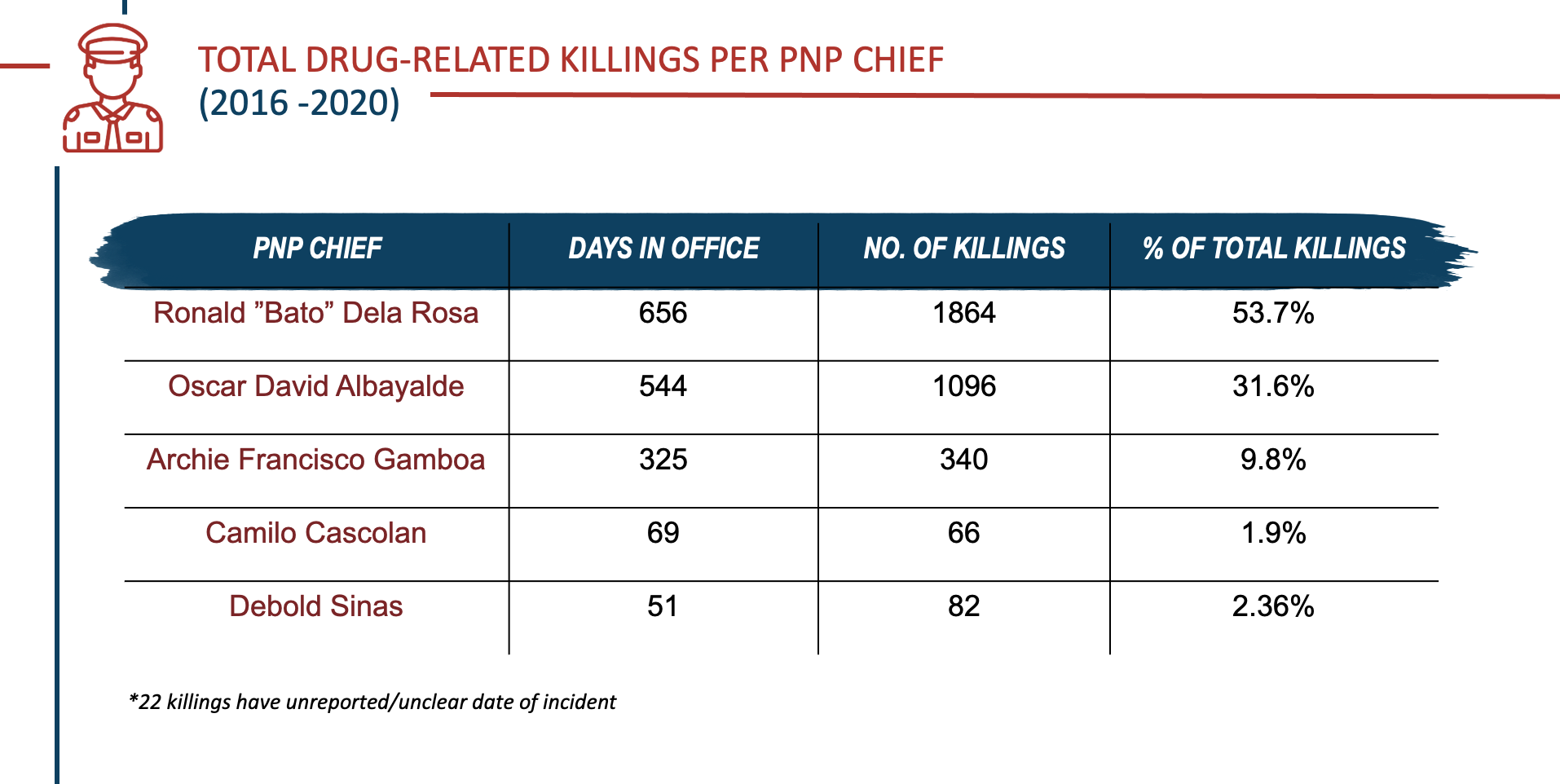
Table 1. Summary of drug-related killings per PNP Chief.
Since the start of the Duterte administration in July 2016, five PNP chiefs have taken their turn in leading Duterte’s war on illegal drugs: Dela Rosa, Oscar David Albayalde, Archie Francisco Gamboa, Camilo Cascolan, and Debold Sinas.
On average, these are the numbers of those killed in the drug war during each PNP chief’s term: under dela Rosa, three every day, under Albayalde, two; under Gamboa, one; under Cascolan, one; and under Sinas, as of December 2020 at least, two a day.
This is from the data gathered for the project, “Violence, Human Rights, and Democracy in the Philippines” by the UP Third World Studies Center and the Department of Conflict and Development Studies of the University of Ghent. These averages are a conservative count that are based on media reports that rely mostly on the police as the primary source of information.
But there appears to be a significant number of drug-related killings the media were not able to report. The Philippine Drug Enforcement Agency, on January 30, 2021 reported that from July 1, 2016 to December 31, 2020 there were 6,011 “persons who died during anti-drug operations.”
The project, on the other hand, recorded 3,470 drug-related killings.
Each PNP chief made his own calculations on how best to conduct Duterte’s war on drugs. What remains clear is that, based on our data, the number of minor players (pushers and users) killed far outnumbers those designated as high-value targets. The ratio stands at 1:5.
Other important details: out of the 3,470 killings, 2,511 of the victims were killed by law enforcers either in official or unplanned anti-drug operations. There were 54 victims of non-state agents, 752 were killed by unidentified assailants, and 153 by unknown assailants.
Dela Rosa
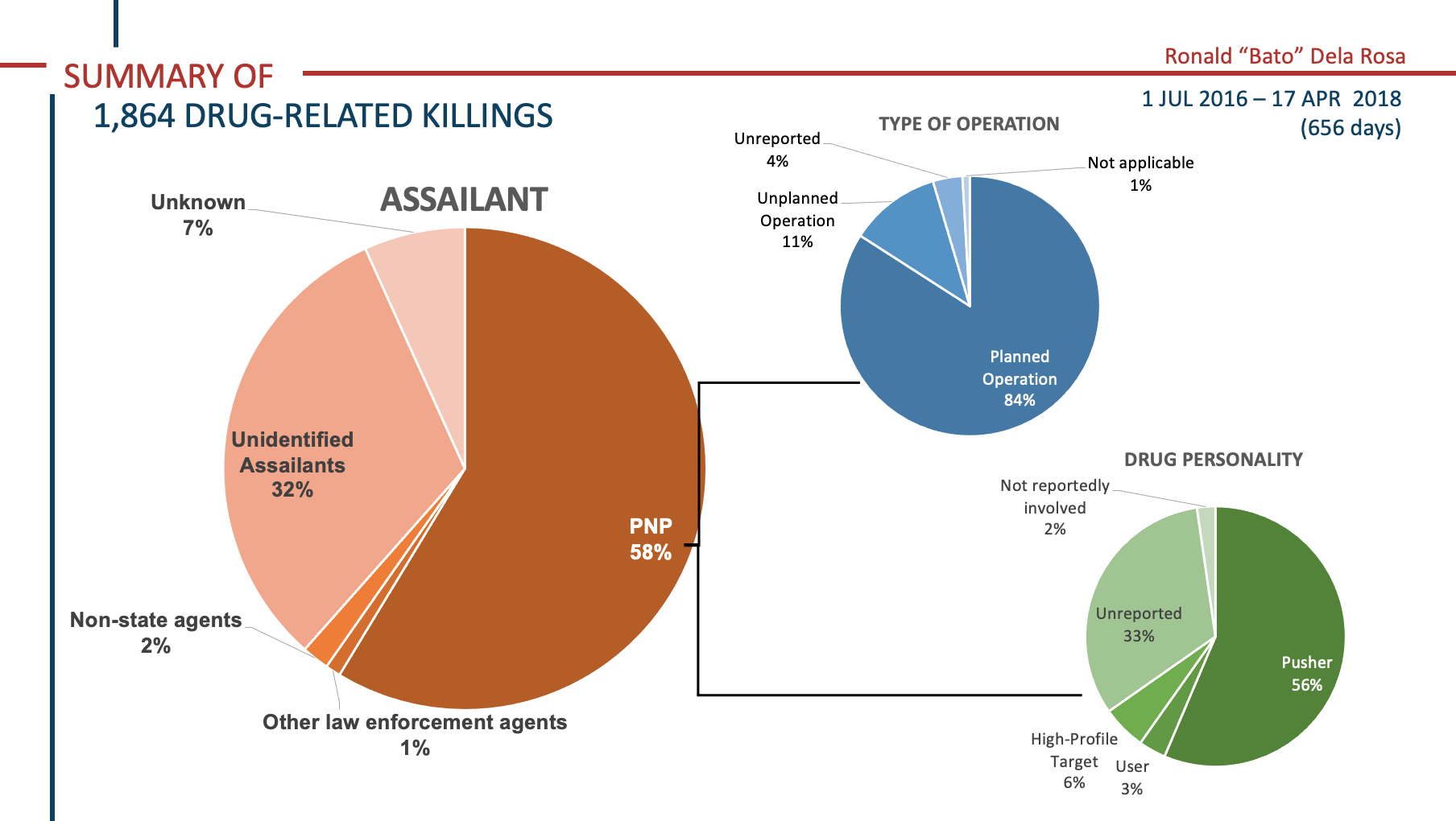
Of the five PNP chiefs that served Duterte, Dela Rosa, to date, served the longest: 656 days.
His ties with Duterte go back to their Davao days, when Dela Rosa served as the city’s police chief from January 2012 to October 2013. He implemented the prototype of “Oplan Tokhang,” then called “Oplan TukHang,” alongside Duterte as mayor. This operation sought to stop the illegal drug problem in the city by knocking at the house of each known drug suspect and pleading with them to surrender.
In a Rappler report, dela Rosa, who staunchly believes that illegal drugs are the root of heinous crimes, claimed that it was a success. He said drugs in the city went down by 60%. This claim is put in doubt by a 2016 Philippine Star report that designated Davao CIty as the country’s murder capital from 2010 to 2015.
In the first month of Tokhang’s implementation, with the PNP under Dela Rosa’s command, 310 persons were reported killed in official anti-drug operations and vigilante-style killings in the country. It remains the highest number of drug-related killings reported in a month.
In fact, one has reason to believe that drug killings committed by law enforcers intensified with the release of Dangerous Drugs Board Regulation No. 1 Series of 2016 for “Operation: ‘Lawmen’.” It institutionalized rewards for law enforcers who conducted successful anti-drug operations.
Throughout Dela Rosa’s term, changes were made to refine “Project Double Barrel.” For instance, on October 26, 2016, “Oplan Double Barrel Alpha” was instituted as a reinvigorated anti-drug drive supposedly targeting high-value targets particularly in the entertainment and government sectors. Of those killed in the drug war during Dela Rosa’s term, six percent were identified as high-profile targets.
While this development in the PNP’s operational plan does acknowledge 1,725 drug suspects killed in the preceding months, these served less a starting point for measures to prevent further killings.
Instead, in an Inquirer report on the revitalized “Double Barrel” project, PNP’s then Director for Operations Camilo Cascolan, who also later became PNP chief, restarted the casualty count on October 26. He said this will give the drug war a fresh start and for enforcers to “do their best again just like from the start.”
A lot have happened in between “Double Barrel Alpha” and its succeeding iteration “Double Barrel Reloaded.” For one, South Korean businessman Jee Ick Joo was kidnapped and killed by members of the PNP inside the police national headquarters. This prompted Duterte to suspend Tokhang operations for a month and a half (January 30, 2017 - March 16, 2017).
Dela Rosa told the public safety and order committee of the House of Representatives on March 14, 2017 that “Reloaded” will be “less bloody” by rooting out what he called “scalawags” cops using the campaign to kill drug peddlers who might expose their involvement in the drug trade.
By the end of Dela Rosa’s term as PNP chief on April 17, 2018, at least 1,864 individuals were killed in official anti-drug operations and vigilante-style killings.
Information on the victims’ drug involvement often comes from police investigations, and inclusion in a drug watchlist is treated as evidence of links to illegal drugs.
Under Dela Rosa, the police used 1,711 sources of information regarding the victims’ ties to the drug trade prior to the killing. In many cases, there were multiple sources, hence the total exceeds the number of victims slain by the police.
Fifty-three percent or 914 were sourced from prior or ongoing investigations on the victim. Twenty-three percent or 398 came from a drug watchlist. The rest were gathered from records of previous arrests, convictions, or surrenders in drug-related crimes, as well as from an informant or from unidentified sources. Links of 280 victims to the illegal drug trade were unreported.
This staggering record of drug-related killings under Dela Rosa’s watch as PNP chief, especially those where police were involved, has raised concerns from local and international human rights groups and media about the integrity of the police to spearhead the anti-drug campaign.
Dela Rosa should have left office on January 21, 2018 as he reached the mandatory retirement age of 56. However, Duterte ordered him to stay indefinitely, citing problems still to be solved inside PNP. Dela Rosa’s term lasted until April 18, 2018. He was then assigned to head the Bureau of Corrections, to supposedly put a stop to the drug trafficking inside national prisons. He then ran and won as senator in the 2019 elections.
Albayalde
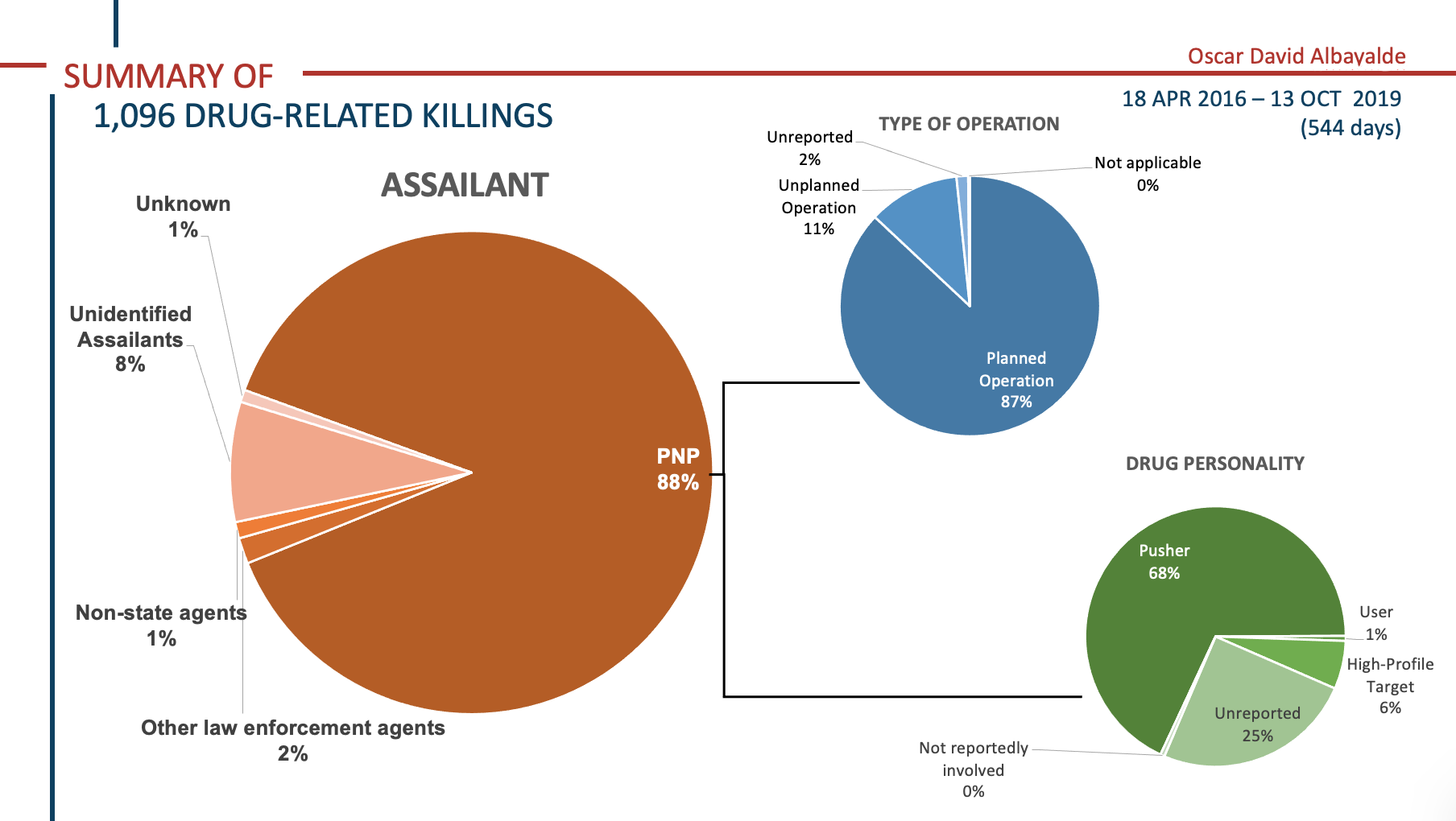
Percentages are rounded and 0 pertains to a value greater than 0 but less than 0.5.
Dela Rosa personally recommended to Duterte then National Capital Region Police (NCRPO) Chief Oscar Albayalde to be his successor. They were batchmates and both belonged to the Philippine Military Academy Sinagtala Class of 1986. Albayade was reportedly chosen because he was tough and strict--just what the police needed according to Duterte. It was during his term as NCRPO chief that the whole Caloocan police was sacked for the murder of 17-year-old student Kian delos Santos and other unsolved killings.
On the day of his appointment as the new PNP chief, Duterte reminded Albayalde to further promote the government’s war on drugs.
During his term from April 18, 2018 to October 13, 2019, a total of 1,096 drug-related killings were recorded — a number comparable to figures recorded during Bato’s term. This is in spite of the PNP’s release on January 29, 2018 of new Tokhang implementing guidelines that appear to ensure that the propensity to kill is suppressed, and cops who abuse their power are held accountable.
Its key provisions include: complying with the rule of law and human rights; the participation of representatives from the barangay council, human rights group, or the religious sector; encouraging use of body cameras; and for Tokhang teams to not engage hostile suspects.
Furthermore, in a Sun.Star report, PNP spokesperson Dionardo Carlos said that a one-strike policy will be observed, meaning a single violation of the guidelines by a Tokhang team would result in their precinct commander being relieved from his post.
Still an overwhelming 90% or 987 of the reported killings were committed by law enforcers. Cases involving the PNP as assailant make up 968 cases or 88% of those killed.
Of those killed by the police under Albayalde’s term, a little over 99% or 963 were reportedly involved in drugs. In the five or less than one percent that were not reportedly involved, these include the deaths of Gian Habal and Kateleen Myka Ulpina, age six and three respectively, who were caught in the crossfires of police operations.
To establish the victim’s drug involvement, 1,105 sources were tapped. Eighty percent or 883 of these sources were prior or ongoing investigations on the victim, while 12 percent or 135 were drug watchlists. The rest were drawn from records of previous arrests, convictions, or surrenders for drug-related offences, reports from informants or unidentified sources. In 70 cases, it was not reported how the police determined the victims’ drug links.
Albayalde’s supposed strict and strong leadership, however, apparently did not apply to men close to him. During a police anti-drug operation in 2013, when he was still the provincial chief in Pampanga, police officers dubbed as “ninja cops,” engaged in bribery with drug suspects and took more than 200 kilos of shabu. Albayalde was allegedly aware of this practice but even gave those involved in the anomalous raid favorable positions inside the agency. He, however, repeatedly denied these allegations in the Senate probe of the said incident.
Albayalde resigned as PNP chief on October 14, 2019, a few days before the end of his term on October 29, 2019. He went on a “non-duty status” until his mandatory retirement age at 56 on November 8, 2019. On January 16, 2020, he and the 12 police involved in the recycling of drugs in Pampanga were charged with graft.
This issue further tainted the PNP’s reputation, and placed immense pressure on the next PNP chief to clean their name while still ardently putting the fight against illegal drugs at the forefront of operations.
Gamboa
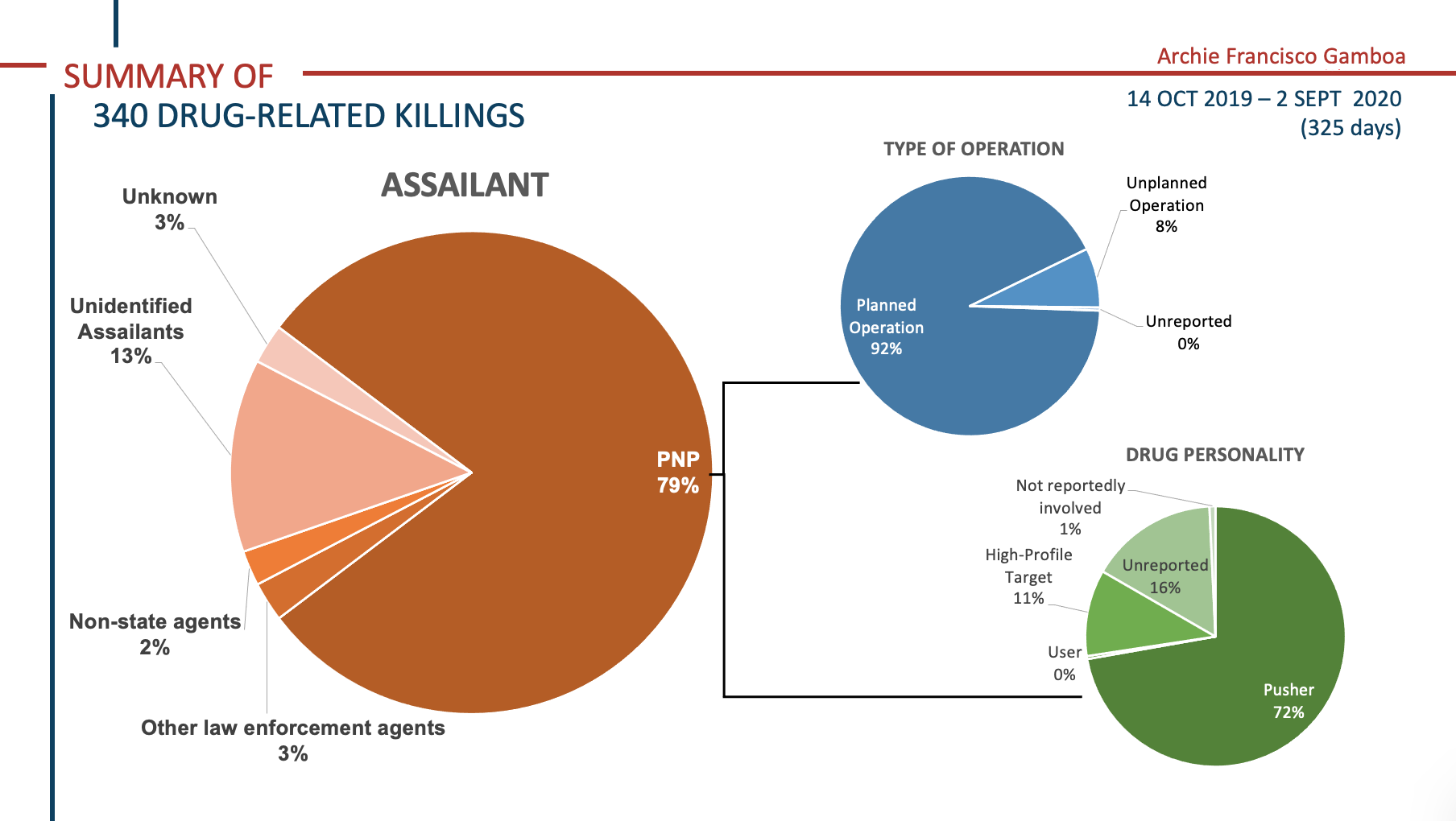
Percentages are rounded and 0 pertains to a value greater than 0 but less than 0.5.
To fill the vacuum in leadership, the PNP’s deputy chief of administration, Lt. Gen. Archie Francisco Gamboa was named officer-in-charge on October 14, 2019. Duterte officially appointed him as PNP chief on January 20, 2020. Gamboa is a lawyer who belongs to same PMA class as the other 3 appointed PNP chiefs under Duterte. He is also known as one of the “Davao cops” and a close friend of Dela Rosa.
Gamboa said that as the PNP chief and as a lawyer, he wanted that “everything shall be above board and compliant with the requirements of due process, human rights, transparency, and public accountability.”
Like the other PNP chiefs, he vowed to intensify the war against drugs even amidst a pandemic. He was quoted as saying he would like to focus on high-value targets.
Reports would still show, however, that pushers comprise a large majority of the casualties —195 victims or 72%. Only 11% or 29 victims were high-profile targets.
Nonetheless, the drug war numbers under Gamboa’s watch seem to back his words. Compared to his two predecessors, a higher ratio of high-profile targets to pushers were killed during his term. The number of high-value or high-profile targets killed reached 11 percent compared to his predecessors’ six percent.
Information against the victims were gathered from 329 sources. Eighty-one percent or 265 of these were prior or ongoing investigations on the victim. Sixteen percent or 50 of these were a drug watchlist, three percent were their records of previous drug arrests, convictions, or surrenders.
Majority of the cases were recorded while the country was under the government-imposed lockdown to curb the spread of COVID-19.
In a previous Vera Files report, we recorded 53 drug-related killings from March 15 to May 5, 2020. Human Rights Watch reported a 50-percent rise in drug-related deaths in the country during lockdown from April to July 2020 compared to December 2019 to March 2020, based on government #RealNumbersPH data.
Drug-related killings continue to press on as lockdowns ceaselessly get extended.
On September 2, 2020, Gamboa retired from his post. Many parts of the country remained under community quarantine then.
Cascolan
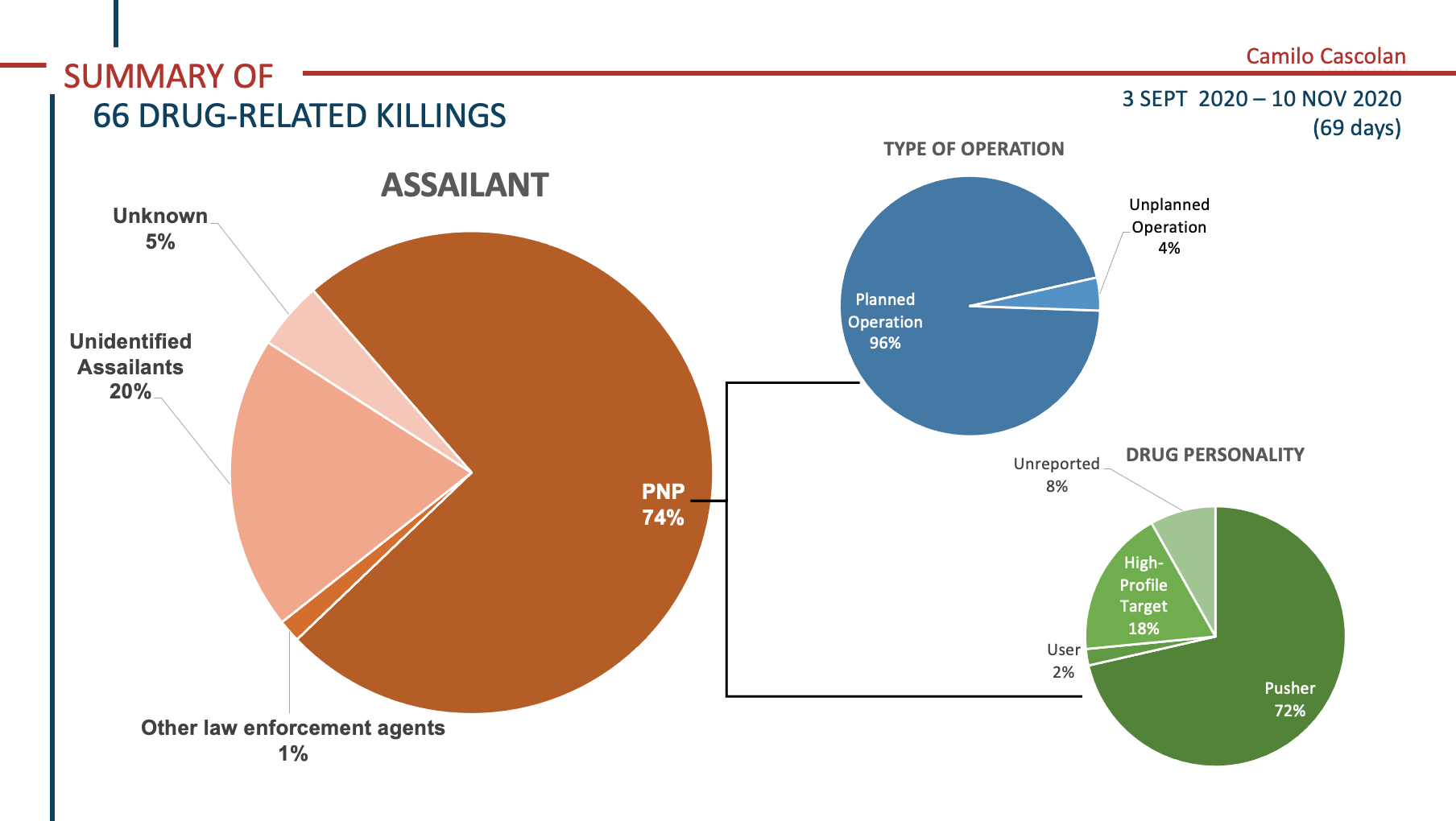
Because of his age, Gen. Camilo Cascolan served as PNP chief for only about two months before reaching mandatory retirement age on November 10, 2020. He took over from Gamboa on September 3, 2020. He was also part of the PMA Sinagtala Class of 1986.
Cascolan said that he would not allow human rights violations in the implementation of the anti-drug campaign under his watch, and that they will focus on high profile targets, in line with Oplan Double Barrel.
He admitted that Oplan Tokhang, “when it was implemented by some officers of the Philippine National Police” became problematic, “that’s why there are a lot of cases that we are having right now against those PNP personnel who have violated the rule of law and human rights.”
Given his two-month term, Cascolan focused on building the capacities of drug enforcement units to collar high value targets as well as mitigate the abuse of power.
Under his watch, drug-related killings persisted as a result of both official anti-drug operations and vigilante-style killings. In two months, 66 drug-related killings were recorded, 74% or 49 of which were committed by the PNP, sometimes hand-in-hand with other agencies.
Fifty-nine sources of information were used to determine their drug links. Seventy-eight percent or 46 cited prior or ongoing investigations, 10%, or six, drew from records of previous arrests, convictions, and surrenders, 8%, or five, were drug watchlists, and three percent, or two cases, were reports from informants.
Sinas
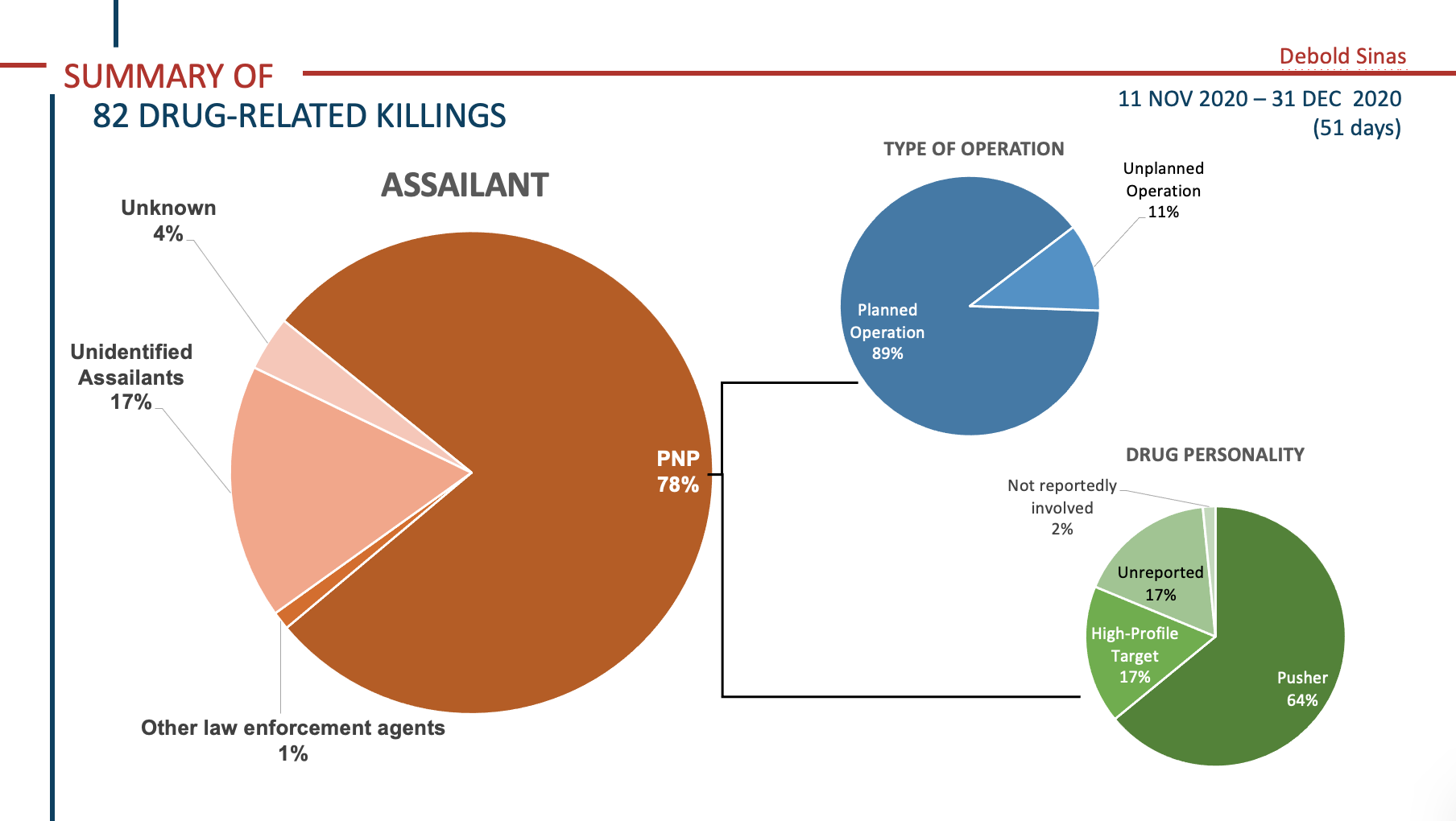
Succeeding Cascolan, President Duterte appointed then Metro Manila police chief Gen. Debold Sinas; a decision that has confounded and angered many due to his involvement in a controversy on May 8, 2020. Metro Manila cops held a birthday party for Sinas, effectively violating the ban on large gatherings they are tasked to enforce under quarantine.
His background would reveal an even more insidious legacy. Before becoming Metro Manila’s police chief, he held the same position in Central Visayas from July 18 to October 2019.
Under his term, the Commission of Human Rights office in that region was alarmed at the rise in drug-related killings in the area. His performance in carrying out Duterte’s war on drugs apparently was a decisive factor in his appointment as the PNP’s new police chief.
In an interview with DZMM Teleradyo on November 11, 2020, Interior Secretary Eduardo Año relayed Duterte's orders for the new police chief: “The President gave emphasis to the war on illegal drugs and on the CPP/NPA/NDF.”
According to a report by CNN Philippines on November 5, 2020, Sinas’ leadership intends to use the drug war to target “illegal drug sources instead of small-time users.” Like previous chiefs who vowed to achieve a similar goal, Sinas’s current figures point to a different story. Alarmingly, the numbers hint at a situation similar to what his leadership had wrought in Central Visayas.
From his appointment until the end of 2020, a mere month and a half into his term, we have recorded 82 drug-related killings. Police accounted for 78% or 64 of these killings, which were sometimes carried out alongside the Armed Forces of the Philippines or Philippine Drug Enforcement Agency.
While data confirms high-profile targets were killed more than users, given that no drug user was reportedly killed yet, small-time pushers at the lower level of the drug trade still outnumber high profile targets killed by about four to one. Pushers compose 64 percent or 41 of the killings involving the police under Sinas while high-profile targets make up 17 percent or 11 of these cases.
As for the sources of prior information on their involvement, 82 sources were referred to in total. Prior or ongoing investigations on the victims compose 73% or 60 of these. Ten percent or eight were records of previous arrests, convictions, or surrenders for illegal drug activities, nine percent or seven were acquired from drug watchlists, and another nine percent, or seven cases, were unreported sources.
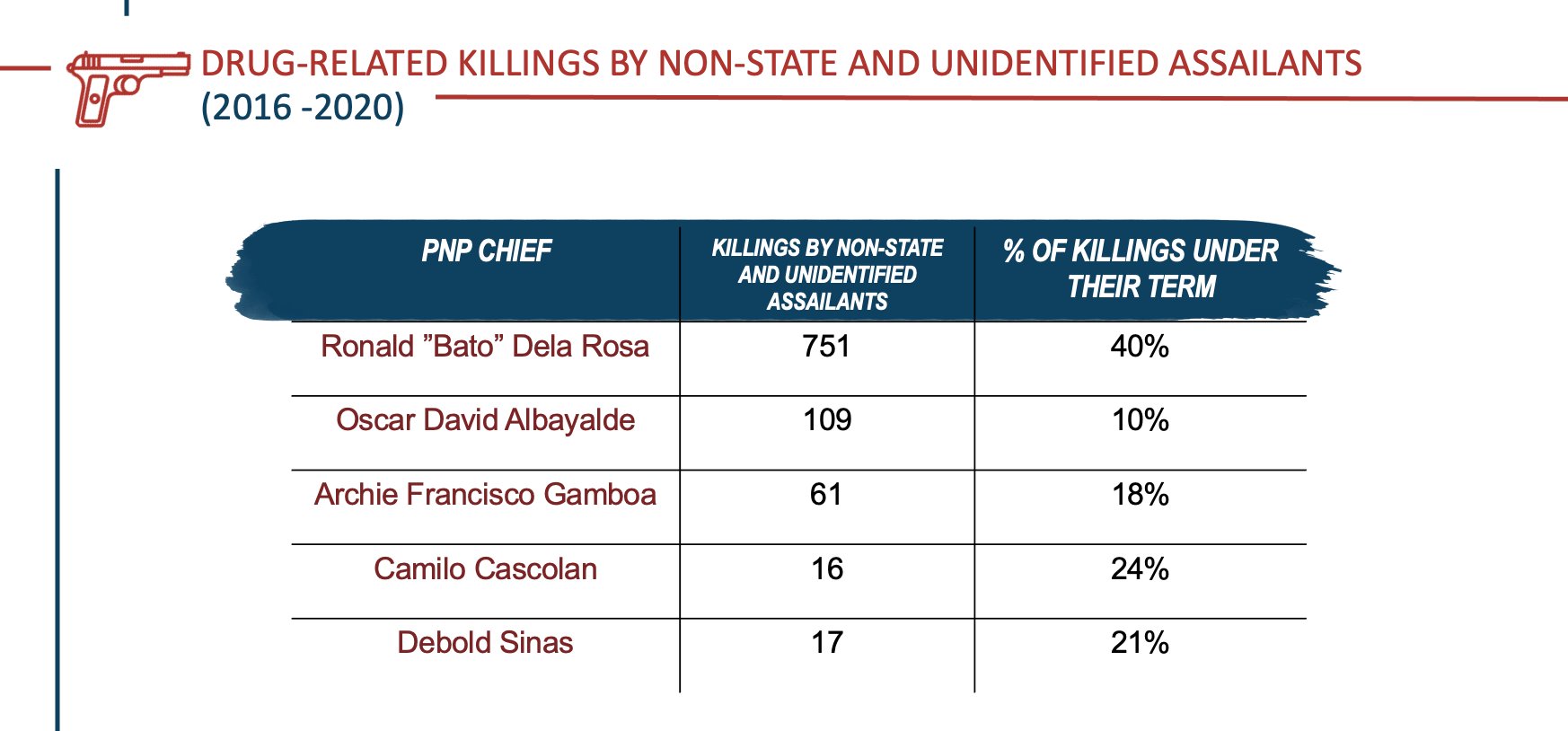
Table 2. Summary of drug-related killings committed by non-state agents and unidentified assailants.
Four and half-years into Duterte’s six-year term and five PNP chiefs later, hardly mentioned as a problem that must be solved were the killings reported to have been committed by non-state agents and unidentified assailants.
The PNP chiefs, past and present, may swear to police their rank, to focus on high-value targets, but the still significant number of those killed in the drug war other than by armed state agents portrays the PNP leadership as ineffectual.
As worrisome is the data that most of the fatalities were known to the police as they have been previously investigated for involvement in the drug trade. This lends credence to a number of investigative reports alleging the PNP is contracting out the killings of drug personalities.
After four and a half years, the monthly and yearly tally of those killed in the drug war have indeed decreased. But the drop in fatalities seem to have no impact on the class of people getting killed. Despite repetitive pledges by PNP chiefs to get the “bigger fishes” of the illegal drug trade, low-level pushers still bear the greater brunt of this lethal campaign.
Nixcharl C. Noriega and Jamaica Jian G. Gacoscosim are research associates at the Third World Studies Center, College of Social Sciences and Philosophy, University of the Philippines Diliman. This piece is part of the on-going research project, “Violence, Human Rights, and Democracy in the Philippines.” The project’s output can be accessed at dahas.upd.edu.ph.
(VERA Files is composed of veteran journalists who take a deeper look at current issues. Vera is Latin for “true.”)
- Latest






























